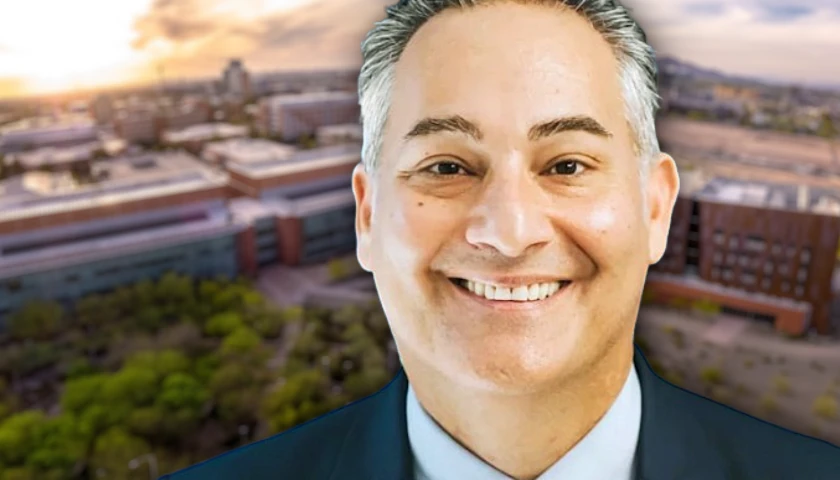A bill by State Representative Quang Nguyen (R-Prescott), extending the Good Samaritan Drug Overdose law, was signed into law by Governor Katie Hobbs (D) on Thursday, prompting a statement of celebration from the lawmaker.
“This is an example of good policy getting passed even with divided government,” said Nguyen. “Prosecuting people who seek or provide lifesaving assistance in drug overdose cases can have a chilling effect and delay or even prevent timely help during a medical emergency.”
🚨FOR IMMEDIATE RELEASE🚨
Governor Signs Representative @QuangNguyenAZ’s #HB2168 to Extend Good Samaritan Protections for Arizonans Who Help Overdose Victims
READ MORE 👉 https://t.co/sYllWIyCzC@AZHouseGOP #AZLeg pic.twitter.com/35Skoafufi
— Arizona House Republicans (@AZHouseGOP) April 10, 2023
Nguyen’s bill, HB 2168, does not make any additions to Arizona law; it just ensures that the law does not change. In 2018, former Governor Doug Ducey (R) codified Arizona Revised Statutes (ARS) § 13-3423. Under this law, if a person “in good faith” seeks medical help for someone experiencing a drug-related overdose, that person may not be charged or prosecuted for “possession or use of” an illicit substance. The same applies to the person experiencing the overdose. However, the law is not a complete get-out-of-jail-free card, as officials can still confiscate contraband and make arrests for other crimes that could be involved.
The issue is that the law was only a temporary enactment set to repeal on July 1st, automatically. HB 2168 extends the law until 2028, giving Good Samaritan protections for at least another five years.
When this bill was presented before the Senate Health and Human Services Committee, Nguyen said county attorneys requested the five-year extension. Additionally, Jeff Taylor, a lobbyist representing Matforce, explained that county attorneys want to keep this law as a “moving target” rather than something permanently on the books to try and avoid people taking advantage of the immunities granted.
Another nearly identical bill introduced by State Senator Anthony Kern (R-Glendale), SB 1088, which would have permanently extended the protections outlined by the law. However, since its introduction, SB 1088 has received a strike everything amendment from Nguyen relating to traffic violations. The legislation now specifies that a person other than the vehicle’s driver must present a patrol officer with identification if the officer believes that the passenger has committed a traffic violation.
Furthermore, not only did HB 2168 pass the legislature, but it also passed with an emergency clause, which required a two-thirds vote from both houses. When it came to the Senate Floor, the bill received a nearly unanimous yes vote. Only one lawmaker voted no, State Senator Juan Mendez (D-Tempe), who stated he opposed the bill because he believed the extension should be permanent, not pushed back for a few years. Because the bill had an emergency clause, it went into effect immediately after receiving Hobbs’s signature.
“I appreciate the strong support of fellow legislators on both sides of the aisle to extend this important protection for Arizonans. It will undoubtedly help save lives,” Nguyen said.
Drug overdose deaths is a critical issue here in Arizona. HB2168 will save lives. pic.twitter.com/R7zKkyXvca
— Quang Nguyen (@QuangNguyenAZ) April 7, 2023
According to the Loose Law Groups, there are several Good Samaritan laws in Arizona, which generally protect people and healthcare professionals from certain penalties if they act in good faith. For example, a medical expert who provides care at the scene of an emergency is not liable for negligence. Moreover, a civilian who administers an EpiPen for someone experiencing an allergic reaction when there is no professional present is not subject to civil liability for any injuries caused by the administration unless they act with willful misconduct.
As for opioid-related deaths, the Arizona Department of Health Services revealed that, as of April 6, there had been 114 overdose deaths this year.
– – –
Neil Jones is a reporter for The Arizona Sun Times and The Star News Network. Follow Neil on Twitter. Email tips to [email protected].
Photo “Quang Nguyen” by Arizona House Republicans. Background Photo “Pills” by Myriam Zilles.








